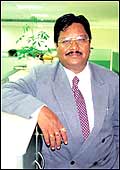 |
DIFFERENT STROKES
How the three funds differ. |
SAFE: 50 per
cent or more in government securities, 30 per cent in corporate
FDs and 10 per cent in domestic equities. Nothing in international
equities
BALANCED: 30 per cent in government
securities, 30 per cent in corporate FDs, 30 per cent in domestic
equities, and 10 per cent in international equities
GROWTH: 25 per cent in government
securities, 25 per cent in corporate FDs, 40 to 50 per cent
in domestic equities and 10 per cent in international equities |
For
insurance companies, banks and mutual fund players, it is really
the next big thing. With the government weeks away from opening
up the Rs 300,000-crore pension market and that too to just six
players-five private and one public sector-intense jockeying to
be one of the six has begun in the financial services industry.
After all, it is for the first time that the huge pension corpus
is being made available for private management. This accompanies
the demise of the lifelong state-funded pension scheme, which will
no longer be available to government employees, other than those
in the armed forces, who join after October 1, 2003 (See The New
Proposal).
New recruits, according to the scheme, will
now have to contribute 10 per cent of their salary, and a matching
contribution will be made by the government. Employees will also
have the option to invest in any of three fund types: safe, balanced
and growth-depending on their aptitude for risks (See Different
Strokes). The employee will also have the option to switch from
one fund to another, but without the right to withdraw funds before
retiring or turning 60.
Given the size of the pension corpus (a study
by Professor R. Vaidyanathan of the Indian Institute of Management
Bangalore suggests that the taking could be as high as Rs 326,000
crore by 2005), not everyone in the industry is happy that the game
has been limited to just six players. Says Sanjay Sachdev, CEO &
MD, IDBI-Principal, Asset Management Company: "While we do
not recommend limiting the number of fund managers to six, we do
recommend stringent entry criteria, thereby ensuring that the participants
are financially sound and capable of handling huge funds.''
Sachdev's wish-list of criteria says that companies
should have a networth of Rs 100 crore, an active business presence
and a consistent and acceptable investment track record. That's
akin to what Deepak Satwalekar, Managing Director and CEO of HDFC
Standard Life Insurance has to say. "Instead of limiting the
number of players, the government should set stringent conditions
for entry into this sector; otherwise it will limit the choice for
the consumers-something similar to what has happened in the insurance
sector,'' he notes.
Besides, the ''pro-more'' camp argues, the
government is setting up an independent Pension Fund Regulatory
and Development Authority (PFRDA) that will oversee the working
of the funds and, therefore, instead of playing the door-keeper,
the government should focus more on products that each player will
bring to the table.
THE NEW PROPOSAL
What the government plans. |
»
Put all Central Government employees joining
October 1, 2003, under the new pension plan
»
Get employees to contribute 10 per cent of salary to pension,
and make a matching contribution
»
Offer three fund types-safe, balanced, and growth-depending
on investor risk appetite
»
Set up a Pension Regulatory Authority to oversee the working
of the six fund managers |
Just which companies will get their foot in
the multi-crore business is the burning question among the industry's
13 insurance companies and 34 mutual fund companies. Insurance companies
argue that for them "it will be a natural progression'', since
both insurance and pensions are "two sides of the same coin"
and involve making investment decisions for long-term funds. Secondly,
because of its existing distribution network in terms of agents
and brokers banks-the argument goes-insurance companies may be in
a better position to keep their distribution costs low. Finally,
since success in the pension sector involves mainly two things-accumulation
and annuity pay out-the insurance sector believes that it makes
the ideal candidate because of its long experience in a similar
business.
The mutual fund industry, on the other hand,
has its own set of arguments. Fund managers believe that there is
a tremendous synergy between the existing business and the proposed
pension and payout annuity business. ''We plan to capitalise on
our existing infrastructure, intellectual capital, and the strengths
of the local and global experience that our sponsors bring to our
investment business,'' says Sachdev. Mutual fund players also contend
that their existing teams of investment analysts and fund managers
are more than adequate to service the potential needs and opportunities
of the new business.
Yet, there remains a lot of confusion as far
as the new scheme goes. For instance, will the new scheme, like
the Old Age Social and Income Security (oasis) committee report,
talk about a guaranteed rate of return (9 per cent from LIC for
senior citizens) and penalise those fund managers who under perform?
Will it allow only 26 per cent foreign equity or increase it to
49 per cent? Till the final draft is out, the players are keeping
their fingers crossed.
-Ashish Gupta
EXECUTIVE TRACKING
 |
| Ashok Bhasin: One of three |
Bhasin's Move
The buzz has it
that Ashok Bhasin, Vice President, Marketing, Whirlpool India, isn't
happy. Why should he be: last fortnight, his company hired Marico's
erstwhile head of marketing Arvind Mendiretta as, what else, Vice
President, Marketing. Bhasin, who, in his own words, considered
himself ''part of the furniture'' at Whirlpool is reportedly juggling
offers from a FMCG company, a TELCO, and Whirlpool's American parent.
That's quite a menu.
 |
| Anil Sharma: Seeking Nirvana |
Another Exit
Last fortnight,
Anil Sharma, arguably India's finest Six Sigma trainer quit Reliance
Infocomm where he was head of training and learning development.
The former Modi Xerox and GE India staffer seemed set to join former
Chrysalis partner Raj Kondur's Bangalore-based BPO start-up Nirvana.
Sharma, who spearheaded GE's Six Sigma initiative in India, joins
a growing number of high-profile execs- think Amit Bose, Shailendra
Gupte, Geeta Chaudhury, Venkatesh Valluri, Radhika Balasubramaniam,
and Rajesh Kurup - who have left Reliance Infocomm in the recent
past. Well, all we can say is that much like GE, Reliance has a
culture where you either fit in, or walk out through the front door.
-Moinak Mitra
DASH
BOARD
 C- C-
This reformist has feet of clay. Last fortnight, Union IT, Telecom,
and Disinvestment Minister Arun Shourie let on that BSNL may shelve
its international long distance plans because VSNL already has the
infrastructure, he saw no point in duplicating it, and Tata Group
Chairman Ratan Tata had written him a letter airing his concerns
(the Group controls and manages VSNL).
 A- A-
The grade comes with a minus tag because the deal hadn't
been signed when this magazine went to press, but it looks like
after many months of waiting and back-room stratagems, Kumar Mangalam
Birla's Grasim, will end up with L&T's cement division.
BPO DESTINATION
Port Louis Calling
 |
| Devendra Chaudhry: Log on to Mauritius |
Almost 500 years
ago, the Portuguese discovered it. Now, the 2,040-sq km island-nation
wants India to discover it-not as a tourist getaway, but as a bpo
window to the Francophone world. "Mauritius is cheaper, removed
from troubled hot spots and has loads of cultural affinity,"
points out Devendra Chaudhry, CEO, Business Parks Mauritius. Tracmail,
a BPO joint venture between Mumbai-based Adi Cooper and the US-based
Stream International, already calls the tourist resort its home,
and the Gurgaon-based Daksh e-Services may be next. Says Sanjeev
Agarwal, CEO of Daksh, which also looked at Philippines and Malaysia:
"We are considering Mauritius seriously because it has a good
labour pool, proximity to India and good telecom infrastructure."
From a $64 million it turnover this year, Mauritius aims to reach
the $400-million mark by 2008. "India's share will be substantial,"
says Chaudhry. Daksh & Co. willing, one may add.
-Moinak Mitra
|

